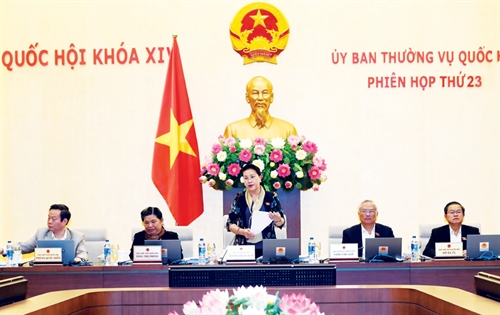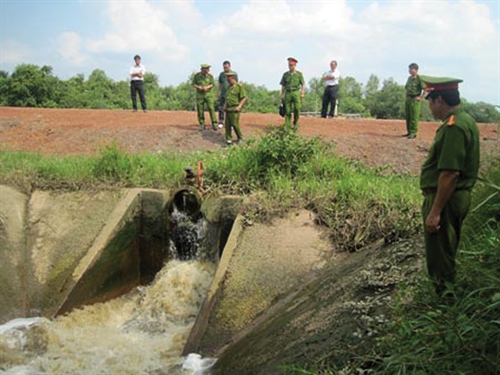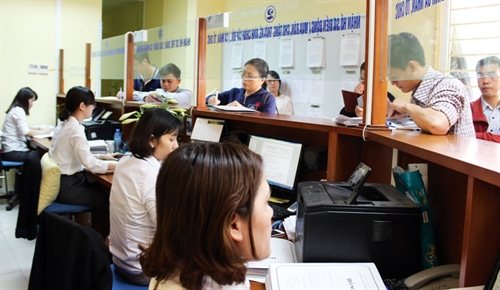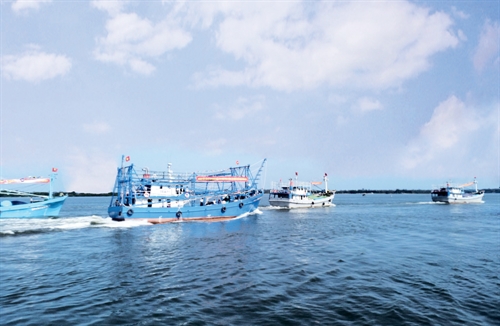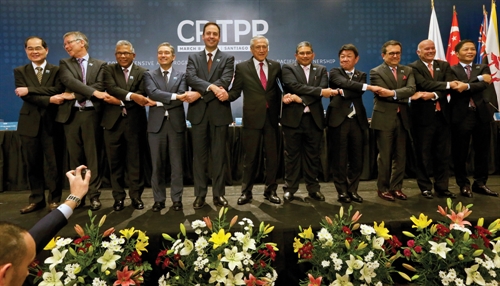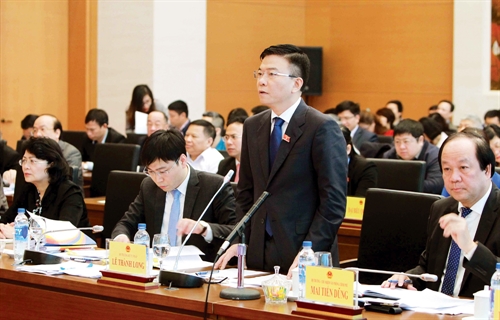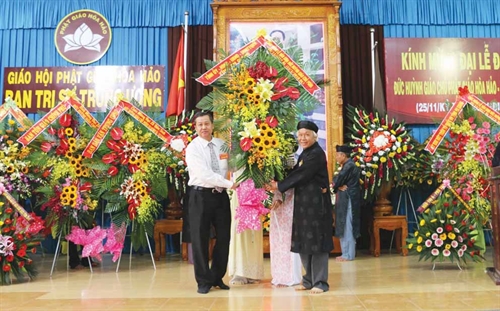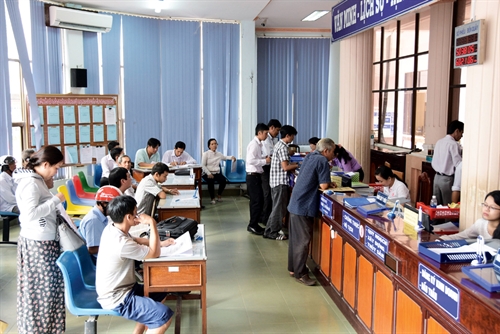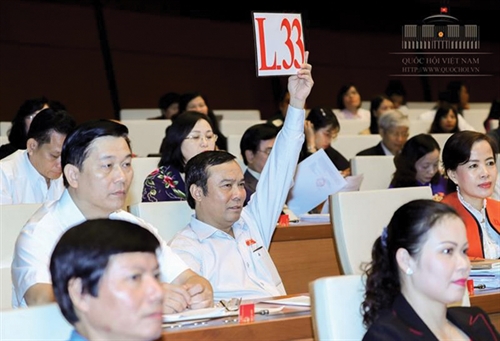On March 22, on behalf of the Political Bureau, General Secretary Nguyen Phu Trong signed a resolution (No. 23-NQ/TW) on the national industrial development policy until 2030 with a vision toward 2045. Below are main contents of the Resolution
Goals
By 2030, Vietnam will accomplish its industrialization and modernization, basically becoming a modernity-oriented industrialized country among the top three ASEAN countries in industry, with some of its industries being globally competitive and deeply participating in the global value chain.
By 2045, Vietnam will become a modern, industrialized country.
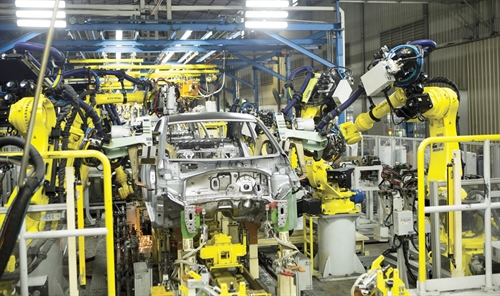 |
| Robotic automobile assembling line in the Hyundai auto plant in Gian Khau industrial park (Ninh Binh province)__Photo: Hoang Hung/VNA |
Seven specific targets for 2030
* The industrial sector will account for over 40 percent of GDP, with manufacturing and processing industries making up some 30 percent and manufacturing industry alone account for over 20 percent.
* The value proportion of hi-tech products from the processing and manufacturing industries will reach at least 45 percent.
* The average annual growth rate of industrial added value will be over 8.5 percent, in which that of the processing and manufacturing industries will be 10 percent.
* The average annual growth rate of labor productivity in the industrial sector will be 7.5 percent.
* The Competitive Industrial Performance (CIP) Index will be among the top three ASEAN countries.
* The proportion of labor in the industrial and service sectors will surpass 70 percent.
* A number of large-scale, multinational and globally competitive industrial clusters and industrial enterprises will be built.
National industrial development policy orientations
Policy on spatial distribution and industrial restructuring
The distribution of industrial space will be adjusted to meet the requirements of restructuring industries and developing economic sectors in each region and each locality in the direction of concentration and not spreading evenly according to administrative boundaries, ensuring environmental protection, national defense and security. Policies will be adopted to promote the shift of industries largely depending on natural resources and labor and badly impacting the environment to hi-tech and environmentally friendly ones.
Specific criteria, conditions and mechanisms will be created to identify and develop industrial clusters, first of all in regions and localities where industrial clusters have initially been formed or where exist advantages in transport infrastructure, geo-economics, natural resources, labor and logistics. Mechanisms and policies will be applied on a pilot basis for building industrial clusters for a number of products of priority industries.
State support for development of industrial clusters will focus on creating a favorable investment and business environment, building infrastructure facilities, and encouraging all economic sectors to take part in development of industrial clusters. State agencies will develop criteria and methods for evaluating the performance of industrial clusters, industrial parks and hi-tech parks.
Mechanisms and policies will be created to promote the internal restructuring of the industrial sector toward higher added value and smartness level. It is necessary to accelerate the integration of information technology and automation in industrial manufacturing in order to create smart production processes and smart plant models and develop smart products and devices. Smart technology standards and production techniques will be developed and issued.
Policy on development of priority industries
A number of industries will be selected for priority development. Such selection must be based on results of objective analysis of the country’s advantages and a selected industry must be the one that is able to participate deeply in the global production network and value chain; has a fundamental significance and a high spill-over effect; uses clean and environmentally friendly technologies; and is able to create high added value. Some labor-intensive industries in which Vietnam still has advantages will be also prioritized.
In the period up to 2030, priority will be given to the development of information technology and telecommunications and electronic industries to attain the world’s advanced level, meeting the requirements of the 4th Industrial Revolution so as to create the digital technological platform for other industries; clean energy, renewable energy and smart energy industries; and processing and manufacturing industries to serve agriculture and meet international standards. The development of the defense and security industry in combination with the civilian industry will also be prioritized. The textile and garment and footwear industries will be further developed, but focusing on high added value-creating phases with smart and automated manufacturing processes. Priority will be also given to the development of such engineering industries as automobile, agricultural machinery, construction equipment, industrial equipment, electric equipment and medical equipment.
In the 2030-45 period, Vietnam will prioritize the development of new generations of the information technology and telecommunications industry; universalization of digital technology, automation, high-end equipment, new materials and biotechnology.
State support policies for priority industries must comply with the market mechanism and international commitments signed by Vietnam. Such a policy must have a specific duration (five years on average but not longer than ten years). State investment in priority industries will mainly be supporting and encouraging the participation of the private sector. Not too many priority industries should be selected to ensure adequate, necessary resources.
Policy to create an environment conducive to industrial development
Policies to ensure firm macroeconomic stability will be further pursued to facilitate investment attraction and industrial development. Financial, monetary and tax policies will be improved to support and promote industrial development. The financial market restructuring will be accelerated, ensuring a rational structure between the monetary market and capital market. The securities market will be developed into an important channel for raising medium- and long-term capital for industrial development. To adopt policies to support industrial enterprises eligible for issuance of stocks and bonds and listing on the domestic and international securities markets.
A flexible exchange rate policy will be implemented aiming at boosting and supporting the export of priority industrial products of the country. Special mechanisms will be created to increase investment credits in high-value industrial fields, priority industries, hi-tech industries and allied industries. Policies on credit extension to the production network and value chain in industrial production based on efficiency of investment projects will be further improved. An effective operation mechanism will be developed for venture capital funds.
Tax reduction and exemption at reasonable levels and over appropriate periods will be granted for priority industries and smart industries. Connectivity between the tax administration and customs and among related agencies under the national and ASEAN single-window mechanism will be accelerated. Regulations on fighting transfer pricing and tax evasion will be improved to conform to international practices.
Access to finance and credit (including foreign loans) will be improved for industrial enterprises, especially small- and medium-sized and innovative ones. All barriers and inequalities in access to finance and credit will be thoroughly removed for industrial enterprises of all economic sectors.
The industrial product market will be reorganized. The implementation of the market price mechanism with regard to essential commodities (such as petrol, coal, electricity, water ...) will be stepped up. The system of technical regulations and standards in the industrial sector appropriate to protect domestic production and consumers will be built and implemented. Appropriate guidance and support will be provided for industrial enterprises to effectively participate in the signed FTAs. Trade barriers will be soon lifted and monopoly and unfair competition practices will be suppressed. Modern trading types and methods will be developed. National trade promotion programs for industrial products will be implemented.
New import markets for raw materials and equipment for industrial development will be found to avoid dependence on some existing markets. Quality inspection of imported industrial goods will be intensified and technical barriers will be deployed to reasonably protect the domestic market in conformity with international commitments and practices.
The fight against smuggling, trade frauds, counterfeit goods and infringements of intellectual property rights in the industrial sector will be stepped up, ensuring a healthy production and business environment.
Policy on development of industrial enterprises
The reorganization and renewal of state enterprises in the industrial sector will be accelerated. The State will only hold controlling shares in enterprises operating in industries of special economic importance and associated with national defense and security. The State will adopt policies to encourage and support the formation of large, multi-owner economic groups in the industrial sector, which are capable of competing on the regional and world markets.
Domestic private industrial enterprises will be developed into a true driving engine for national industrial development. Importance will be attached to the elaboration and implementation of policies to raise technological capability and governance capacity for domestic industrial enterprises. Policies to encourage and support the formation of large private economic groups and enterprises in the industrial sector will be adopted.
The development of small- and medium-sized industrial enterprises and supporting enterprises of all economic sectors will be stimulated. Industrial development consulting service enterprises will be formed and developed. Criteria will be formulated for selecting and developing supporting industries, focusing on the weak phases of the product value chain or stages decisive to the quality and value of industrial products. Support will be provided for the development of suppliers in priority industries, regarding this as the core of the supporting industry development policy.
Foreign direct investment (FDI) will be further attracted in the industrial sector, particularly the processing and manufacturing industries. The orientation for selecting and encouraging FDI projects in various industries up to 2030 is to prioritize projects using “high, new, clean and economical” technologies, using lots of domestically manufactured materials and components, having a high ratio of spending on domestic scientific and technological research and development, committing to technology transfer and training for local workers; and prioritizing joint ventures and production links with domestic enterprises. Priority will also be given to multinationals with internationally recognized brands and high competitiveness, and to foreign firms operating in the supporting industries.
Policy on development of human resources for the industrial sector
Mechanisms and policies will be studied and implemented for development of human resources for the industrial sector, meeting the requirements of industrialization and modernization, especially the requirements of the 4th industrial revolution.
The network of professional and higher education institutions in the areas of technology and engineering will be re-planned. Efforts will be concentrated on developing a number of universities and vocational training institutions of technology and engineering up to international standards. Technical and technological training will be promoted.
The private sector and enterprises will be encouraged to participate in the training of high-quality human resources for the industrial sector. Research and training will be associated with production and business as well as the industrial labor market demand.
Mechanisms and policies will be improved for the synchronous development of the industrial labor market in terms of labor size and quality and structure of occupations. Mechanisms and policies will be created to orientate the shift of labor, especially agricultural labor to industrial labor and rationally distribute workers in different regions.
Social welfare will be guaranteed for industrial workers. Salary and wage policies will be renewed in conformity with the market principles, with wage rises based on higher labor productivity. Policies to attract and employ people with high technical skills and innovative capacity, particularly foreign experts and Vietnamese overseas, will be adopted.
Importance will be attached to the training and development of entrepreneurs with high professional qualifications, modern management and administration skills, business ethics and sense of responsibility for the country and people.
Greater importance will be attached to building a pool of Vietnamese industrial workers with industrial manners, a high sense of discipline and high skills, capable of absorbing and creating new technologies and working effectively.
Science and technology policy for industrial development
Breakthroughs will be created in infrastructure and application of information and communication technologies, particularly digital connection (4G and 5G) infrastructure. A national digital transformation strategy will be formulated. Investment in developing big data centers will be promoted; sciences of big data analysis, management and processing will be developed in order to create new products and knowledge. A strategy for Vietnam’s access to and proactive participation in the 4th Industrial Revolution will be formulated and implemented.
The national program on technology renovation up to 2020, the program on development of a number of hi-tech industries, and the national program on raising productivity and quality of Vietnamese enterprises’ products and goods up to 2020 will be further implemented effectively.
The science and technology market will be developed strongly and synchronously. The protection and enforcement of intellectual property rights, particularly intellectual property in the digital age, will be intensified. Proper policies will be adopted to support and encourage organizations, individuals, research institutes, universities and enterprises to invest in research and development, technology transfer and application of scientific and technological advances to production and business.
Domestic and international cooperation in research and development, application of science and technology, and purchase, sale and transfer of scientific and technological products will be enhanced. The commercialization of scientific and technological research outcomes will be stepped up. Consultancy, evaluation, brokerage and pricing services for scientific and technological products will be developed. Mechanisms and policies will be created to enhance cooperation and technology transfer between national defense and security and civilian industries.
Industrial technologies will be oriented and tightly controlled on the principle of combining cutting-edge technologies and advantages of countries going behind and the gradualist approach with a view to making the optimum use of the “golden population” period and effectively exploiting the existing production capacity. The import of industrial machinery, equipment and technologies will be strictly managed, ensuring high quality and efficiency.
The State will support the building and development of science and technology enterprises in the industrial sector, particularly in the priority industries. Mechanisms and policies will be adopted to promote the development of incubators of technologies and science and technology enterprises in key and priority industries.
Policy on exploitation of natural resources and minerals, environmental protection, and adaptation to climate change in the course of industrial development
Baseline geological surveys, prospecting, exploration and assessment of the natural resource reserves in the mainland and continental shelf of the country will be intensified. Strategies, master plans and plans for the effective management, exploitation and use of natural resources and minerals will be formulated. Only modern mining and processing technologies which protect the environment and bring about sustainable socio-economic effects will be allowed for application. Land policies and laws will be revised to create favorable access to land for industrial enterprises in accordance with the market mechanism and master plans.
Climate change adaptation, natural disaster prevention and control and environmental protection requirements will be incorporated in all industrial development strategies, plans, programs and projects. Policies to promote investment projects using energy and natural resources economically and protecting the environment will be implemented. Technical regulations on the environment of industries will be revised. The environmental protection responsibilities of industrial plants will be clearly defined and strict sanctioning measures will be imposed against violations. Policies to encourage the strong development of the environmental industry and socialization of environmental protection will be developed.-(VLLF)
